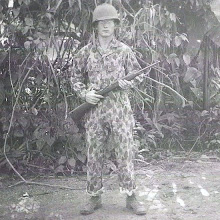
(Letter from Vic to brother Rudy and wife Ann, written from the South Pacific to Passaic, New Jersey. In the bottom left corner of the envelope is the writing "Censored by (no name). Above that is a stamp "Passed by U.S. Army Examiner 25603". The photo shows a picture of a soldier posing with several Solomon Island children, all of them smoking.)
Dear Ann and Rudy,
I've long been waiting your overdue reply to my last letters. Have you been answering promptly? I'm well aware the mail services isn't as speedy as it formerly was at my last location, but had you replied within a reasonable period it surely would be here before now.
Which reminds me, we can now say that prior to the present location we were situated in that super-delux (!) area, Guadalcanal. Yes, that's the place we went back to from Roviana (New Georgia). Presumably it was a 'rest period' but there were plenty of details. In some respects the Canal beats all the other Solomon Islands and in others it doesn't. Tho the thermometer may almost set maximum records there, the humidity is far more comfortable than that encountered in the New Georgia group. Then too, traveling up to the equator from the Canal one enters zones of heavier precipitation.
Actually, nothing suits the humane environment in so far as I'm able to judge. The closer to the equator one gets, it seems the natives are of less sturdy physical proportions. There should be several reasons for this.
The Solomons were practically isolated from the outside world due to their position in the Pacific. Being off the trade route to either the orient or Australia and New Zealand, very few whites got to see these coral and volcanic islands. British and Australians craft of trade schooner tuypes sailed through the Solomons, taking out cargos of copra and other coconut products. Can't see what else they might have taken on. Surely it wasn't pearls as I never heard of any being found in the waters.
One hears so much phoney romance and adventure concerning the South Sea Islands. After twenty-four hours under average conditions, I'll bet most tourists would do anything to get out. Down in either New Caledonia, the New Hebrides, the Fijis, Tonga group or over around Tahiti way, conditions don't constitute your idea of a paradise.
Would like to know how many, if any, of the authors and commentators who write and speak praises of the South Seas were ever down here. Also - why did they ever leave? Aboard a ship or any kind of craft where one's exposed to breezes, one could spend a fairly comfortable short sojourn in these waters provided you don't come ashore.
On land the heat humidity and really becomes noticable. Here too, one encounters the malarial mosquito and a million other varieties of insects and reptiles. The sea is of a deep blue in deep water and in the channels and reefbound inlets gives way to brilliant greens. Frequent squalls come up on the open water but they serve as a relief from the torrid sun.
When a new moon comes up it's swell, but that invariably bids welcome to Jap bombers. The natives aren't as populous as one might expect, but they're always friendly to Americans. They had a rotton deal during the few months the japs dominated. The Nips had them almost starving in several places and took advantage of their helplessness. However some of these boys have cleaned out individuals and small groups of the enemy with maschettes and crude clubs. They can't be beat when it comes to jungle traveling, hunting and tracking. We should give them credit for their part in aiding us to defeat the enemy.
Most natives had seen white men before as the English had this as a protectrate. However, it was only a few years ago when most of them were savages and some cannibals. A few speak fair English. Twuice I've met native fellows who spoke exceptionally well and both had had close association with the British authorities. An English Resident is the official in charge and were located on major islands. The natives are good at handicraft. Most of them were Christians I believe, and I've seen several of their odd chapels. Some missionarys settled here long ago.
On the Canal the Lever Bros., of that well-known soap company, cleared and planted the coconut palms and you probably associate that island with. Fact is, one only finds groves near the sea or on comparatively level ground nearby. Inland the heavy jungle growth or grassy plains stretch. On the latter this coarse grass is chest and even head or greater in height. I guess I misled you when I gave Lever Bros. credit for their plantation work. Actually the natives did all the laboring.
Well, I imagine I won't have to say of these parts in future letters 'cause I seem to've exhausted the subject. Maybe (?) I can dig up some more dope, however, 'case you're interested. Ruts, I'd like to have you send me some (mostly) 120 or 629 film, if that's possible, and any spare paper to make positives of that you might have or can possibly dig up. Send same in small packages via air mail. Kindly let Ed, Rose and gloria read these lines as I have time at present to write them.
Best regards to you all,
Vic
January 19, 1944
Posted by
BN
at
5:45 PM
![]()
![]()
Subscribe to:
Post Comments (Atom)


No comments:
Post a Comment